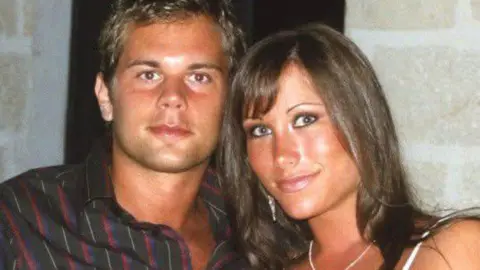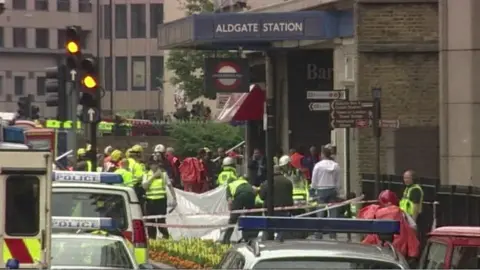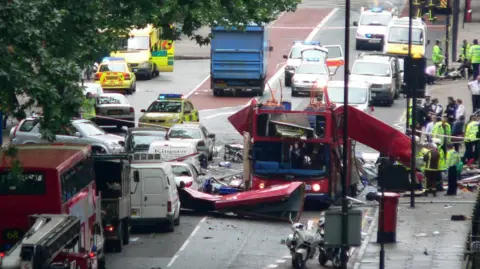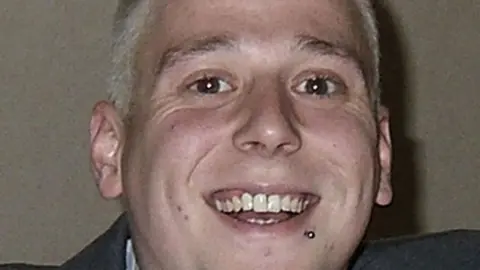Tube bomb survivor shares 20-year impact of 7/7
 Marina Berry-Dealey
Marina Berry-Dealey"It's taken me 20 years to realise all the things you do, how you think, stems from what happened on that day," said Marina Berry-Dealey.
On 7 July 2005, the then 20-year-old was taking part in her usual commute from Hertfordshire to Leicester Square in the heart of London's West End when a bomb went off, plunging her Tube carriage into smoke-filled darkness.
It was one of a series of suicide bombings which struck the capital's public transport system during the morning rush hour, killing 52 people and injuring more than 700.
"I think it almost rewired my brain from a PTSD perspective - I do catastrophise the little things most people wouldn't give a second thought," she said.
"Because what are the chances of a bomb being on a train? And when it does [go off] and you're there and witnessing the trauma of that situation, you do naturally over-think every scenario."
 Marina Berry-Dealey
Marina Berry-DealeyThe attack was the worst single terrorist atrocity on British soil:
- 26 people died in the bombing at Russell Square on the Piccadilly line
- six died in the bombing at Edgware Road on the Circle line
- seven died in the bombing at Aldgate on the Circle line
- 13 died in the bombing on the number 30 bus at Tavistock Square
Mrs Berry-Dealey spoke publicly for the first time on her husband Justin Dealey's BBC Three Counties Radio show.
Having arrived at London's King Cross railway station, she got on to a packed underground train shortly before 08:50 BST.
"The doors closed, the train moved out of the station and it must have been 10 seconds before the explosion," she said.
"I remember hearing a loud bang - well more of a pop - it felt like something was on the roof above us and all the lights went out.
"It filled with smoke and that's when the panic set in with everyone."

Almost immediately, she could hear people screaming in the carriage in front.
The 40-year-old said: "I knew there was smoke and I could feel intense heat so I thought it was a fire.
"I was looking around the carriage and seeing people who were very visibly distressed, but were keeping it under wraps because there was screaming going on."
Everyone's eyes were stinging from the smoke and the lack of information was adding to their fears.
After about 40 minutes, firefighters appeared.
"They got us from the door down the tracks - the next stop was going to be Russell Square, but the front part of the train bore the brunt of the bomb, so they walked us back to King's Cross.
"And everyone was just in shock because nobody knew what it was and no-one had any answers to anything."
 Toby Mason
Toby MasonMrs Berry-Dealey emerged from the Tube station blackened by soot and unable to let her loved ones know she was OK because her mobile phone needed charging.
A man thrust his phone at her and insisting she used it, so she was able to call Mr Dealey, her boyfriend of a year, as well as her mum.
Mr Dealey told her to walk to a pub opposite Euston railway station where he would pick her up and take her home.
She said: "Of course it wasn't open at that time, but I knocked on the door, they saw me covered in black, they let me in, locked the door again.
"They were really kind, sat me down. I was able to charge my phone in there and that's when they put the big TVs on and we started to see the bigger picture."
A short distance away was Tavistock Square, where the bus was blown up.
 Aston Band
Aston BandMrs Berry-Dealey said she was soon under pressure to return to work: "The bomb attacks were on a Thursday and by the following Monday afternoon, I was getting calls saying my work was piling up and they needed me back."
She returned on 14 July, accompanied by Mr Dealey during the commute.
She secured some early morning counselling through the NHS, but she "was told quite plainly [by her employers] it was a bit of an inconvenience doing the sessions, so I think I did two and that was it".
"I do wish I'd gone to the counselling sessions, I think it would have helped me," she said, adding that she believed workplaces would be more supportive 20 years on.
One long-lasting impact is she cannot leave home without a fully-charged mobile.
She said: "It's a problem. I almost get palpitations at the thought of being cut off from the outside world and unable to contact my loved ones."
More positively, her treatment by her employers pushed her to pursue the career she had always wanted and become a TV presenter and singer.
 PA Media
PA Media"Every year I feel very sad on 7 July and I don't feel there's enough done to remember the victims and everybody who lost their lives or was injured. They're in my thoughts," she said.
"There was one person who I remember very clearly, Phil Beer. I remember how vibrant he was and very sadly he lost his life that day."
While they never spoke, they shared the same Hertfordshire commute and he "shifted the mood for more people than me on a morning".
Hair stylist Mr Beer was on his way to work at a salon in Knightsbridge when he was killed in the Piccadilly line bomb blast.
"Twenty years is a long time and it's taken me this long to actually be able to talk about that day publicly," she said.
"It becomes part of who you are - I think it changes you as a person."
Follow Beds, Herts and Bucks news on BBC Sounds, Facebook, Instagram and X.
